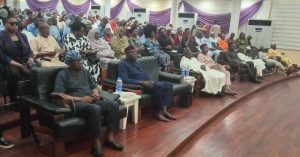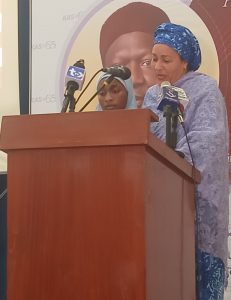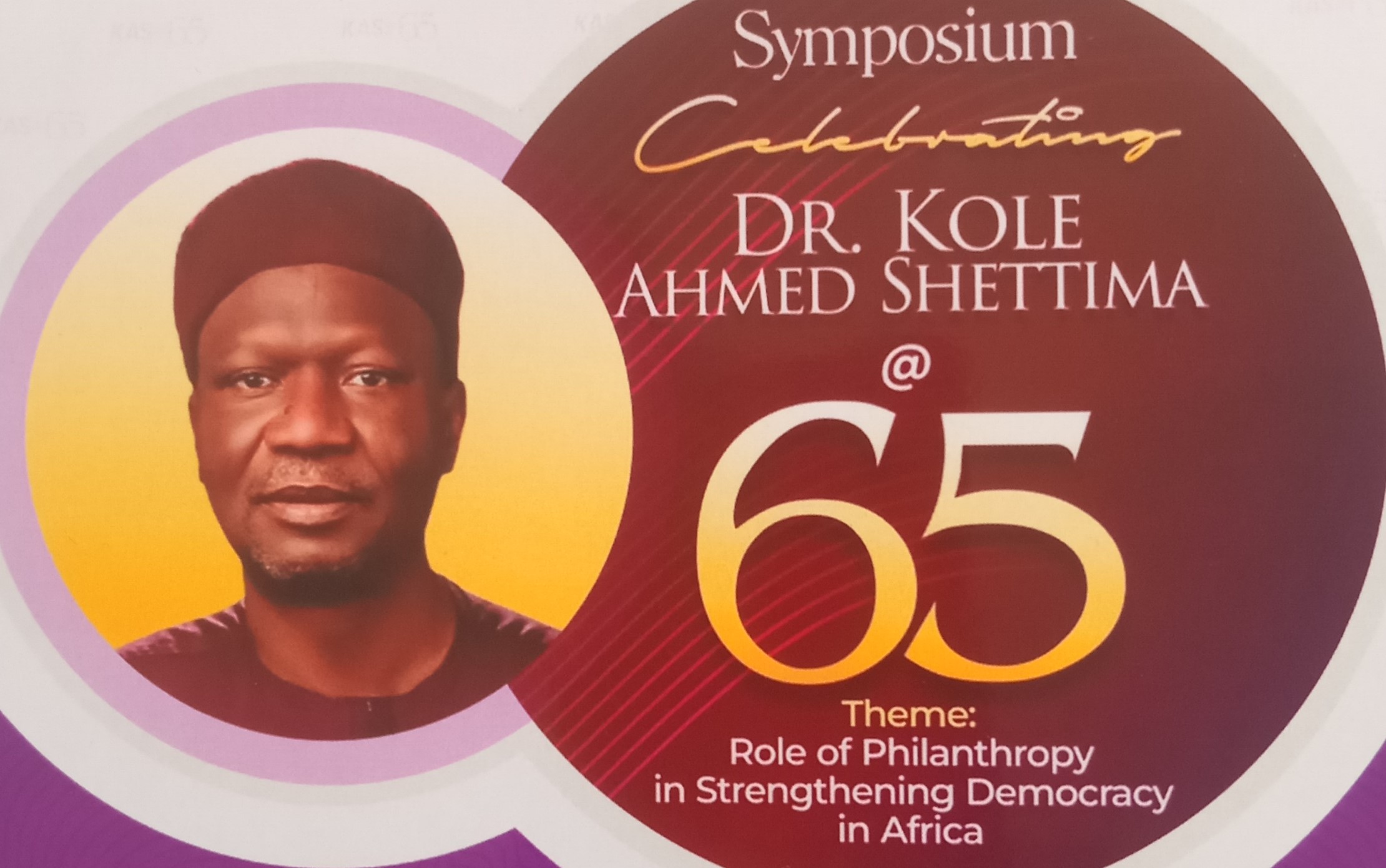Rhizomatic moment is the inescapable grammar for capturing the discontinuously interconnected issues, situations, people, outcomes, models, symbols, memories and even facts that tie together the February 12th, 2025 symposium to mark the 65th birthday of philanthropy mandarin, Kole Shettima. Although rhizomatic moment is not an everyday usage, belonging as it is to a particular lens in social theory, there is no other way of capturing the various issues and situations that popped up in the four or so hours Kole’s 65th birthday lasted.
Intervention’s entry point is to take a sample as they occurred in the speeches, hoping that the most salient of the issues would have been trapped or at least mentioned.

Faces at Kole @ 65
Let’s begin with Eugenia Abu’s dicta that, throughout the event, the celebrant’s name is to be no more than just Kole. That is Kole without any embellishment of titles, designations or honorifics because, according to the masterful MC, everyone is Kole’s friend and the birthday is the day to drive home that message. She expressed gratitude to God too that Kole was not somewhere in the rural areas supervising one empowerment programme or another but was at his own birthday. The birthday, she said, should not be privately spent. But why?
Supplying the answer to this poser went to a different set of speakers. In an address written by one of the conspirators but delivered by another, the argument is that celebrating Kole had become a duty because it is only by doing so that the view that “we are all bad”. Kole, said John Odah who ended up reading the address Comrade Y. Z Yáu was to have delivered as chief of the conspirators, has demonstrated unparalleled commitment that not celebrating him would amount to “emboldening the very bad ones in our midst”. Odah was not finished yet. He also equated celebrating Kole with “a search for enhanced democracy of our dreams”.
It is not clear if Comrade Odah was either so angry or so happy that we heard the Marxist declaring that “We have the agency to create the world we want”. Anyway, the audience ignored that structuralist infraction by clapping hands for him and he continued. Our democracy is threatened, said Odah, adding that Nigeria is going through traumatic moment. The more poverty deepens, the more hostile is the government to critical voices. Yet, there is no accountability. Only insensitivity and the resurgence of impunity. The result is weakening confidence in democracy and the associated open call on the military to take-over power. Yes, there is always the sweet honeymoon that follows a military take-over but the morning after the honeymoon is usually full of democratic reversals that questions the military as the alternative to seek.
This is the context for privileging a Kole for his dedication to democracy. It is important to recognise those who do this positively, argued Odah.
Kole is more known today in terms of MacArthur but, long before MacArthur, he has been in the barricades for democracy, stretching from being a member of the now defunct Women in Nigeria (WIN), the anti-apartheid movement in Nigeria, the students movement and its insurgency against commercialisation of education and, of course, the military must go campaign of the 1990s. So, we hope his example will inspire many Koles in Nigeria and Africa, he pointed out.
Those who interpreted the speech as a generational double move would be spot on. On the one hand, the conspirators were saying the only way “they” could retain their sanity is to demonstrate that all of us are not bad. Kole is their testament. On the other hand, they are embarking on a journey of collective re-discovery: how can a father with children like them be still so vulnerable to the lion’s attack? Nigeria is the father. The generation defined by the conspirators are the children. How could the country be basically collapsing before their very eyes and there doesn’t seem to be a collective action in the offing?
Professor Kyari Mohammed, Vice-Chancellor of the Army University in Biu and chairman of the occasion declared full participation in the event even though he was not part of the conspiracy. He watered the ground ahead of the coming debate: Is philanthropy good? Yes. Is democracy good? Yes. Does philanthropy lead to democracy? It was a rhetorical reminder to Dr. Emmanuel Akwetey, the main speaker. Prof Kyari then wished Kole 65 more years.
A happily angry Prof Adele Junaid took the floor without supporting himself while climbing the staircase. And he is 82 or heading there. If it were not for fear that it would amount to blasphemy, a claim of God’s extra attention to the making of Prof Junaid could have been made.
 We begin with his last sentence on the podium. He said “when I look at you in front of me, I feel I can’t give up”. There is so much packed into that because he had started by declaring Kole a “a son of the world”, based on the symbolism of UN’s Amina Mohammed’s presence.
We begin with his last sentence on the podium. He said “when I look at you in front of me, I feel I can’t give up”. There is so much packed into that because he had started by declaring Kole a “a son of the world”, based on the symbolism of UN’s Amina Mohammed’s presence.
Prof Junaid then identified three qualities in Kole. One, Kole represents the grandeur of simplicity, dignity in humanism. “We need somebody like that” as signified in the Yoruba signifier – Omoluabi.
The second is Kole’s intellectual depth for which the evidence a piece by Kole that the Prof came across. It was on Kole’s smelling (and forecasting) as it were, of conflict between bureaucrats and intellectuals brought into government in advisory capacity within the framework of presidential system in Nigeria. The said piece was written long ago which points at Kole’s perceptiveness.
The last is Kole’s concern with developing domestic capacity, particularly the universities.
Prof Jibrin Ibrahim presented his own problem with the Kole universe. One of the courses he taught when he used to be an academic decades ago was Marxism. It meant that as one of the students in his class, Kole was brought up on staples such as aid, philanthropy, etc are scams; part of the traps by which imperialism draws in and traps people into its control system. That is many years ago. Today, he confronts Donald Trump calling foreign aid a scam, the same thing he taught Kole from a Marxist lens. So, how does one distinguish Trump’s own notion of aid as a scam and the Marxist structuring of aid as an imperialist scam? Are they saying the same thing or not?
His second problem is that Kole went on a totally different path, another way of saying Kole took a job that didn’t fit the image of a student groomed in Marxism. And he did the job without compromising any sides as to become a provocation for the question of rethinking philanthropy, aid and democracy. Not surprisingly, he closed his speech by declaring: “this is a great day and event”.
Prof Okey Ibeanu took his place on the podium to tell the story of how Kole jokingly calls himself Ibeanu’s boss. It had an origin in Kole single handedly convincing Ibeanu to join MacArthur. This made Kole his boss, technically speaking. But the two were in the boss’s accommodation on a same keel. It doesn’t happen very often.
Prof Ibeanu is compiling his reminiscences of that era but he is already telling Kole that “we cannot take people like you for granted”.
Dr. Dauda Garba, Executive Director of the Centre for Democracy and Development (CDD) let it be known there is no part of Nigeria Kole’s tenure at MacArthur has not made impact. Mallama Umar Kalgo, a classmate of Kole in the secondary school told the story of how wonderful a classmate Kole was. He was a quiet but brilliant classmate who related with everybody in a very patient and honest way.
Mohammed Kati Machina who represented the Emir of Machina in Yobe State spoke about how people do not know Kole is from Machina but how happy they are that even as educationally backward as the place is in relative terms, they have produced a citizen of the world in Kole. While conveying the Emir of Machina’s goodwill message, he also delivered his own, a story of 59 years of friendship and brotherhood.
Ex-Ekiti governor, Kayode Fayemi described Kole as an inveterate networker and the ultimate barrier – breaker, citing him as the Muslim who once worked as coordinator of the Inter-Church Coalition for Africa in Toronto, Canada. The former governor confessed being a player in diverting Kole from whatever the Marxist pathway would have been to MacArthur. He also credits Kole with being a CDD pioneer and constant pillar, adding how Kole had supported him in politics

Amina Mohammed and Amina Abubakar, the incumbent and perhaps a future D/SG of the UN respectively
Amina Mohammed, UN Deputy Secretary-General, delivered two different messages to the audience simultaneously – the verbal and the symbolic. The symbolic came in the school girl with whom she walked into and shared the podium as a demonstration of her position that the biggest audience in the hall were the students. When Amina Abubakar – the school girl – took the podium, she spoke with masterful confidence of being on her way to being a replica of the Amina Mohammed. The hall took an approving note of that.
The second part of this report will cover how Dr. Emmanuel Akwetey, the symposium speaker established or destabilised the nexus between philanthropy and democracy and Kole’s place in that. And then how the panelists appraised that intervention. In the meantime, even what has been reported so far contains the attestation for the rhizomatic moment argued earlier. No one would be wrong to ‘see’ the event as any of these readings of it:
- A journey of generational self re-discovery on the part of the conspirators
- Inclusivity at its best: From pupils who appeared on television to wish Kole birthday to the dancers from the indigenous Abuja community to the school girls from two Abuja based secondary schools to the UN D/SG and to the activists
- A Kole phantasmatic grip on Nigeria
- Nigeria rising
- The triumph of agency against structure exemplified in the Kole imaginary
- The Kole exceptionalism in being a value-based rather than an evidence-based leader. While both value and evidence are in the eye of the beholder, the positivist or empiricist character of evidence most of the time makes an evidence-based leader a dictator, a dangerous realist. It is a distinction most people do not make because the rationalist influence on human beings is still powerful. This is certain to be the difference between MacArthur’s engagement with the indigenous Abuja community under Kole, for instance and that of other players. The difference MacArthur makes is simply that its own is on the value that makes indigenous communities the king around the world, consisting in generous concessions.
- Kole’s recognition at home as a glocal citizen
- The start of an intense discursive warfare with which Gramsci thinks a counter-hegemonic force can undress a thoroughly discredited order. The only thing though is that there is nothing that looks like a ‘historic block’ yet in Nigeria nor even the ‘collective will’ and, certainly, not yet the chain(s) of equivalence that should drive such hegemonic tussle. Yet, we are in the epoch of pluralistic democracy
Whichever of these meanings a reader attaches to the event is a matter of one’s own baggage.
We can say bye for now with the story of Eugenia Abu’s defeat of her husband, Mister Thompson Abu, in their ‘my university is better than yours’ war that had been raging between the husband and wife. The good news was one of the benefits of attending the Kole birthday. It is always good news when a woman wins a war because that rarely happens. Thompson Abu, the husband, attended the University of Ibadan while Eugenia Abu went to ABU, Zaria. That was before they pursued each other and became one. But even as one, they still had an unresolved joke that made their marriage glow.: which one went to a better university? Yes, Ibadan is the premier university. No debate about that but ABU, Zaria advertises itself as the largest university South of the Sahara and North of the Limpopo. Anyway, we have no idea what Eugenia did but, before Mr. Abu knew what was going on, all their children had graduated and it was from ABU, Zaria. The implication is that, in the event of a test of strength, Mr. Abu will have no troops, with all the all Abusites tugging behind the mother who is an Abusite. The winner of such a test of strength will be a foregone conclusion. To make matters worse, Eugenia is planning to go and take a degree from Ibadan. Why? To completely eliminate whatever advantages Mr. Abu may still have. This is the sort of the extras that comes when a masterful MC is at work.




























